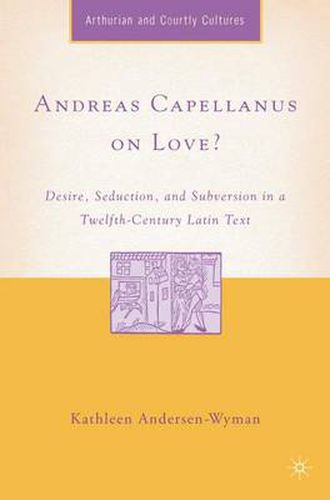Readings Newsletter
Become a Readings Member to make your shopping experience even easier.
Sign in or sign up for free!
You’re not far away from qualifying for FREE standard shipping within Australia
You’ve qualified for FREE standard shipping within Australia
The cart is loading…






This title is printed to order. This book may have been self-published. If so, we cannot guarantee the quality of the content. In the main most books will have gone through the editing process however some may not. We therefore suggest that you be aware of this before ordering this book. If in doubt check either the author or publisher’s details as we are unable to accept any returns unless they are faulty. Please contact us if you have any questions.
This book changes the way the De amore of Andreas Capellanus has been used since Gaston Paris dubbed it the ‘code book of courtly love’ in 1883. Andreas employs courtly material, but for his own subversive purposes. Using Andreas’s text primarily to explain other texts, as has been scholarly practice, misleads us about them, about De amore, and about what is possible in the late twelfth century. Because of the exegetical tools Andreas uses and forces the reader to use, his text undermines sacred and secular institutions and the authorities that conscript desire, erotic or otherwise. Hence, it was the only book ‘on love’ burned in Templer’s inquisitorial fires.
$9.00 standard shipping within Australia
FREE standard shipping within Australia for orders over $100.00
Express & International shipping calculated at checkout
This title is printed to order. This book may have been self-published. If so, we cannot guarantee the quality of the content. In the main most books will have gone through the editing process however some may not. We therefore suggest that you be aware of this before ordering this book. If in doubt check either the author or publisher’s details as we are unable to accept any returns unless they are faulty. Please contact us if you have any questions.
This book changes the way the De amore of Andreas Capellanus has been used since Gaston Paris dubbed it the ‘code book of courtly love’ in 1883. Andreas employs courtly material, but for his own subversive purposes. Using Andreas’s text primarily to explain other texts, as has been scholarly practice, misleads us about them, about De amore, and about what is possible in the late twelfth century. Because of the exegetical tools Andreas uses and forces the reader to use, his text undermines sacred and secular institutions and the authorities that conscript desire, erotic or otherwise. Hence, it was the only book ‘on love’ burned in Templer’s inquisitorial fires.